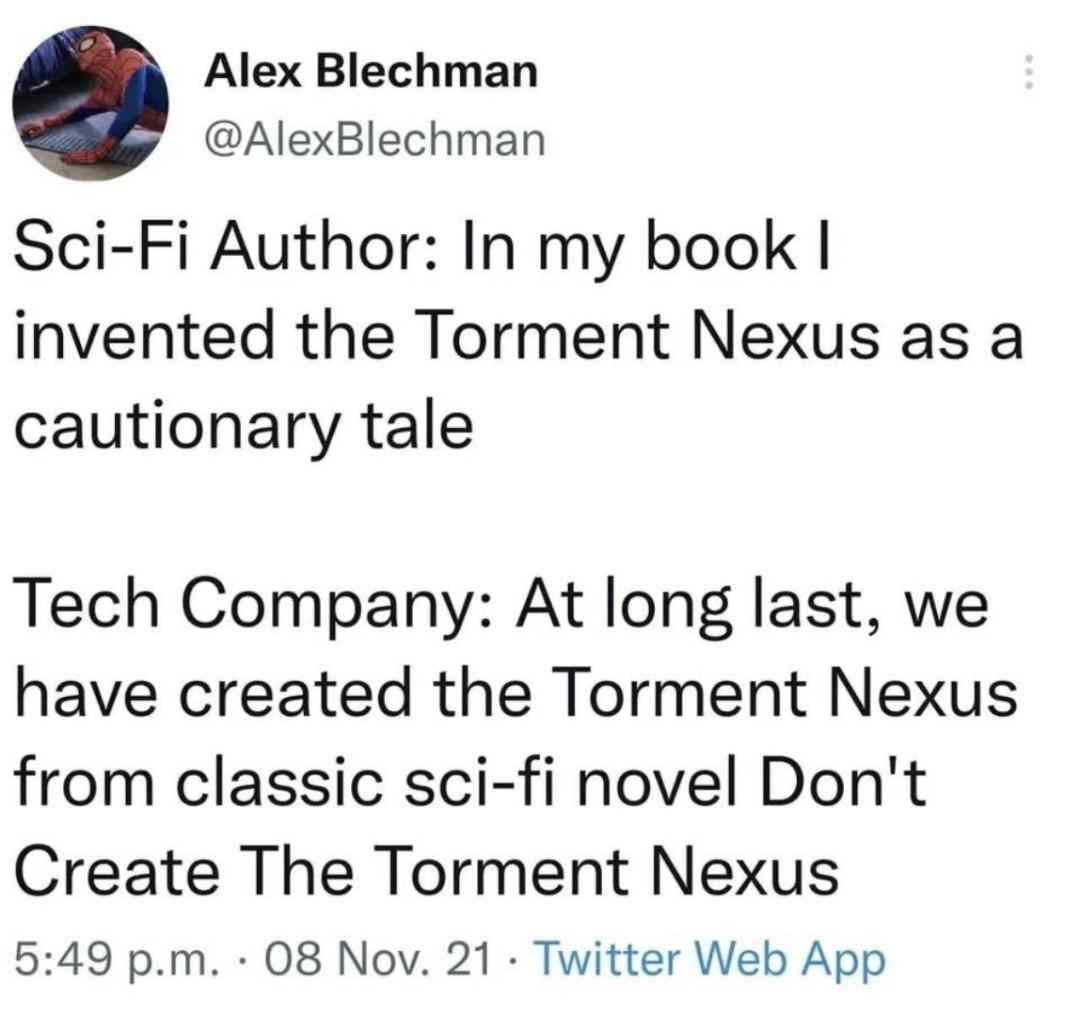this post was submitted on 22 Aug 2023
1582 points (98.9% liked)
Programmer Humor
19618 readers
1 users here now
Welcome to Programmer Humor!
This is a place where you can post jokes, memes, humor, etc. related to programming!
For sharing awful code theres also Programming Horror.
Rules
- Keep content in english
- No advertisements
- Posts must be related to programming or programmer topics
founded 1 year ago
MODERATORS
you are viewing a single comment's thread
view the rest of the comments
view the rest of the comments

How about the following examples:
We have all of those things and the dystopic predictions of the authors who predicted them haven't come remotely true. All of these examples prove my point.
We have autonomous weaponized drones and they aren't running around massacring humanity like the Terminator depicted. Frankly, I'd trust them to obey the Geneva Conventions more thoroughly than human soldiers usually do.
We have had mass surveillance for decades, Snowden revealed that, and there's no totalitarian global state as depicted in 1984.
We've had nuclear weapons for almost 80 years now and they were only used in anger twice, at the very beginning of that. A good case can be made that nuclear weapons kept the world at large-scale peace for much of that period.
Various companies have made attempts at "Corporate controlled hypercommercialized microtransaction-filled metaverses" over the years and they have generally failed because nobody wanted them and freer alternatives exist. No need to ban anything.
Netflix's Squid Game is not a "real-life" Squid Game. Did you watch Squid Game? That was a private spectacle for the benefit of ultra-wealthy elites and people died in them. Deliberately and in large quantities. Netflix is just making a dumb TV show. Do you really think they'd benefit from massacring the contestants?
"MoviePass to track people’s eyes through their phone’s cameras to make sure they don’t look away from ads” - ok, let's see how long that lasts when there are competitors that don't do that.
"Soulless AI facsimile of dead relatives" - firstly, please show me a method for determining the presence or absence of a soul. Secondly, show me why these facsimiles are inherently "bad" somehow. People keep photographs of their dead loved ones, if that makes you uncomfortable then don't keep one.
Each and every one of these technologies were depicted in fiction over-the-top unrealistic ways that emphasized their bad aspects. In reality none of them have matched those depictions to any significant degree. That's my whole point here.
So tell me, what part of their creation was "solving real-world problems" beyond playing to the desires of autocrats and control freaks? What part of their creation was a net positive to society? Or are you happy to live in a world of autonomous drone strikes on weddings and kindergartens, mass surveillance, a thermonuclear sword of damocles hanging over all of humanity, and so on?
Autonomous weaponized drones are useful for fighting wars more effectively, and with fewer lives placed at risk using manned platforms. You may not like that wars are fought, but they will be fought regardless. Drones solve problems that arise in war-fighting.
Likewise, mass surveillance solves problems faced by intelligence agencies. It's also useful for things like marketing studies, medical studies, all kinds of such things. And again, you may not like some of these problems being solved, but they're real-world problems that are being solved.
Nuclear weapons have kept the world's superpowers at bay from each other. They've stopped "world wars" from happening. They don't stop all wars from happening, but there haven't been any major direct clashes between nuclear-armed powers since their invention.
Those metaverses and reality TV shows are entertainment. They are aimed at entertaining people.
MoviePass' ad system is an effort to monetize entertainment, allowing for more to be made.
AI facsimiles of dead relatives are for psychological purposes - helping people work through grief, helping people relive fond memories, providing emotional support, and so forth.
There you go, real-world problems they're all there to solve. And none of them are dystopic nightmares as depicted by the science fiction scenarios you listed, which is the main point I'm making here.
Science fiction authors got their predictions wrong. They spun nightmare scenarios because that's what makes for compelling drama and increased sales of their books or shows. They're not good bases for real-world decision-making because they're biased in incorrect directions.